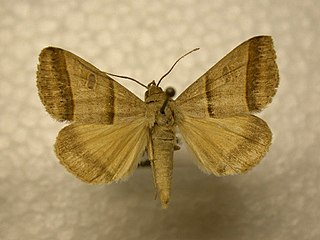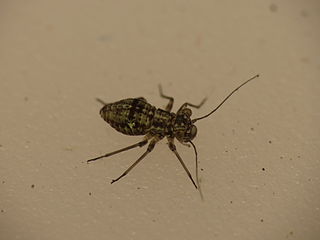
Urumi is a sword with a flexible, whip-like blade, originating in modern-day Kerala in the Indian subcontinent. It is thought to have existed from as early as the Sangam period.
Margaret J. "Margie" Profet is an American evolutionary biologist with no formal biology training who created a decade-long controversy when she published her findings on the role of Darwinian evolution in menstruation, allergies and morning sickness. She argued that these three processes had evolved to eliminate pathogens, carcinogens and other toxins from the body.

Nigericin is an antibiotic derived from Streptomyces hygroscopicus. Its isolation was described in the 1950s, and in 1968 the structure could be elucidated by X-ray crystallography. The structure and properties of nigericin are similar to the antibiotic monensin. Commercially it is obtained as a byproduct, or contaminant, at the fermentation of Geldanamycin. It is also called Polyetherin A, Azalomycin M, Helixin C, Antibiotic K178, Antibiotic X-464.
An immunoreceptor tyrosine-based activation motif (ITAM) is a conserved sequence of four amino acids that is repeated twice in the cytoplasmic tails of non-catalytic tyrosine-phosphorylated receptors, cell-surface proteins found mainly on immune cells. Its major role is being an integral component for the initiation of a variety of signaling pathway and subsequently the activation of immune cells, although different functions have been described, for example an osteoclast maturation.

Faxonius immunis is a species of crayfish in the family Cambaridae. It is native to North America and it is an introduced species in Europe, where it lives along the Upper Rhine. Its common names include calico crayfish and papershell crayfish.
Mesopsocus unipunctatus is a species of barklouse found across the Holarctic. It is a member of the Mesopsocidae family. It is a generalist that occurs on branches of deciduous and coniferous trees, as well as lower hedgerows and shaded meadows.
Mesopsocus blancae is a species of Psocoptera from the Mesopsocidae family that is endemic to Spain.
Mesopsocus duboscqui is a species of Psocoptera from the Mesopsocidae family that can be found in Cyprus, France, Greece, Italy, Slovenia, and Spain.
Mesopsocus fuscifrons is a species of Psocoptera from the Mesopsocidae family that can be found in North Macedonia and Kaliningrad, Russia.
Mesopsocus helveticus is a species of Psocoptera from the Mesopsocidae family that can be found in Austria, Hungary, and Switzerland.
Mesopsocus graecus is a species of Psocoptera from the Mesopsocidae family that can be found in Cyprus, Greece, and North Aegean islands.

ImmuniWeb is a global application security company headquartered in Geneva, Switzerland. ImmuniWeb develops Machine Learning and AI technologies for SaaS-based application security solutions provided via its proprietary ImmuniWeb AI Platform.

A centroblast generally refers to an activated B cell that is enlarged and is rapidly proliferating in the germinal center of a lymphoid follicle. They are specifically located in the dark zone of the germinal center. Centroblasts form from naive B cells being exposed to follicular dendritic cell cytokines, such as IL-6, IL-15, 8D6, and BAFF. Stimulation from helper T cells is also required for centroblast development. Interaction between CD40 ligand on an activated T helper cell and the B cell CD40 receptor induces centroblasts to express activation-induced cytidine deaminase, leading to somatic hypermutation, allowing the B cell receptor to potentially gain stronger affinity for an antigen. In the absence of FDC and helper T cell stimulation, centroblasts are unable to differentiate and will undergo CD95-mediated apoptosis.

Ptichodis immunis is a moth of the family Erebidae. It is found in Mexico, Belize, Costa Rica, Ecuador, Suriname, French Guiana, Venezuela, Brazil, Barbados, Cuba, Martinique, Guadeloupe, St. Kitts, Antigua and Barbuda, Hispaniola, St. Vincent, Grenada, Puerto Rico, Jamaica, the Virgin Islands, as well as in the United States, where it has been recorded from Georgia, Florida and Texas.

Roberto Speranza is an Italian politician of the Chamber of Deputies who serves as national secretary of Article One. From 5 September 2019 until 22 October 2022, he has been serving as Minister of Health in the government of Prime Minister Giuseppe Conte and was later confirmed by Prime Minister Mario Draghi. During his tenure, he had to face the COVID-19 pandemic, which deeply affected Italy.
Optioservus immunis is a species of riffle beetle in the family Elmidae. It is found in North America.
Mesopsocus laticeps is a species of middle barklouse in the family Mesopsocidae. It is found in Europe and Northern Asia, North America, and Southern Asia.

Mesopsocus is a genus of middle barklice in the family Mesopsocidae. There are more than 60 described species in Mesopsocus.
Bending Spoons S.p.A. is an Italian mobile application developer, founded in 2013 and based in Milan. The company is known primarily for iOS mobile apps, including Splice, 30 Day Fitness, Live Quiz, and Remini. In November 2022, it agreed to acquire Evernote. Bending Spoons is one of the world's leading mobile developers, by number of app downloads.
Immuni was an open-source COVID-19 contact tracing app used for digital contact tracing in Italy, dismissed on 31 december, 2022. It makes use of the Apple/Google Exposure Notification system.








